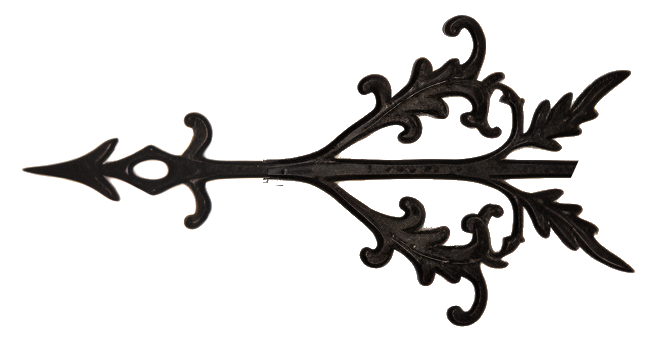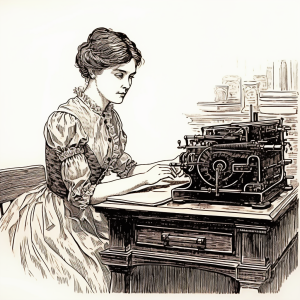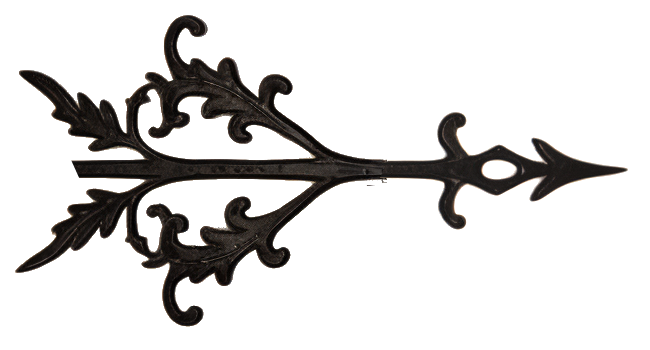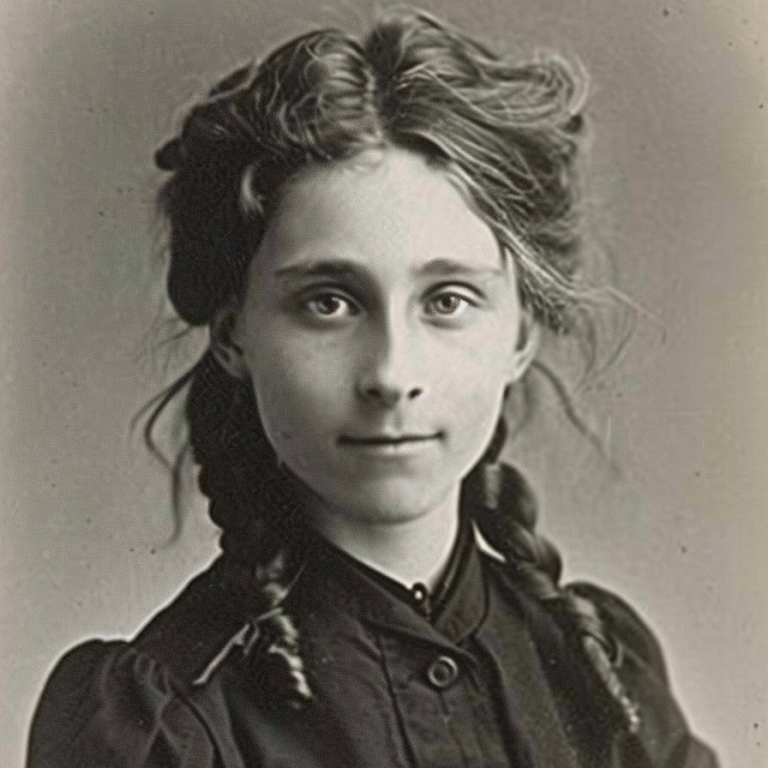CHAPTER III.
A CONTEST WITH FLAT-IRONS.
ON Friday morning I was sent to the “preparing-table” to sprinkle and fold; some servants’ print dresses. From a distance the work had looked easy enough, but Agnes, the head preparer, who, by the way, bore a striking resemblance to the pictures of the Grand Duchess of Hesse, taught me that there was a special method of distributing the water, and a particular twist and turn to give the sleeves and bodice, to say nothing of the compactness and firmness with which they must be folded up. I was impressed with the kind treatment I received from these girls, who looked upon me as a beginner from their own ranks. Not one but tried to help me over the hard places of my first week’s experience, and, despite the awkwardness that I must have displayed in everything I attempted, they tried to encourage me, assuring me that I would get used to things in time.
While Agnes was telling me how hard it had been at first for her to learn the art of shirt-starching, I noticed that an animated conversation was being carried On in another part of the room between Mrs. Morris and Janie. Then Mrs. Morris came over to me, and said she had decided to let me iron a little, and perhaps I would succeed better with it than I had done with marking.
So an extra table was brought into the laundry and fitted up with ironing tools, and, as Mrs. Morris handed me a bag of handkerchiefs, she said—
“Now, mind you don’t pay attention to Mrs. Bruckerstone, that stout woman that’s beside you. She’s the biggest gossip in the place, and will ask you no end of questions about yourself, and tell you all she knows about the other girls.”
Then I was seized with an inclination to cultivate Mrs. Bruckerstone’s acquaintance.
Mrs. Morris led me to the stove, took up an iron and held it with one hand close to her face.
“That’s the way to tell if it’s hot enough,” she explained.
“But suppose the iron should slip and hit me in the face?” I asked, horrified already at the dangers that loomed in my path.
“You must take your chances about that. How else would you know the iron was right?” she answered.
“Why, try it with my fingers, like this. I always did it so at home;” and then I illustrated the way I had managed with the family ironing in Australia.
“Well, that’s not right; but you can do it that way, if you like,” was her reply, as she went back to her own table, where she was always surrounded with books and bills.
I thought then that Mrs. Morris had concluded that a girl so afraid of burning her face would hardly do for laundry work, and I had not a doubt but she would tell me so later on; but I went to the table assigned me, and commenced on the handkerchiefs without any regrets. When I had finished my first piece, I thought it time to open conversation with Mrs. Bruckerstone, who stood near me, ironing children’s frocks.
“I think you iron beautifully,” I remarked, as she returned from the clothes-horse, where she had hung an embroidered baby-dress, which really did her great credit. I could see that I had put myself in Mrs. Bruckerstone’s good graces at once, as she replied—
“When ye’ve been at it long as me, Hi ‘ope ye’ll hiron as well. Hi’ve been in the business twenty years.”
I observed that, if I ever learned to iron half as well as she did, I’d be content, and then we were friends.
I had supposed I knew how to iron handkerchiefs, but Mrs. Bruckerstone said I needed some instructions, and, though I did very well for a beginner, my method was not quite correct. They must be ironed from hem to hem, and folded together with the red cotton mark on the outside, so that the packer would know to whom they belonged.
” Where ye from ? ” she asked.
” Near Oxford Circus.”
“That’s a long waiys off. Must cost ye a pretty penny for trine fare. Ye ought to find lodgings hereabouts.”
“Yes, I’m thinking of doing that if I get on all right. I’m only here on trial now.”
“Going to be a shirt-hironer or finery-hironer?”
“I want to learn the whole business.”
“Then, Hi suppose, yer idee is to be a managress,” said Mrs. Bruckerstone, with the accent on the last syllable.
At that time Mrs. Morris was not in hearing, and all the girls began to tell how they expected to spend the coming Bank Holiday, which was Whit Monday. When several had declared their intentions of going to fairs and “theayters,” Mrs. Bruckerstone turned to me, and asked how I should celebrate the day. I replied that I thought I should go to Hyde Park.
“Got a young man?” was her next question.
“Oh, yes,” I answered.
“What do he do for a living?”
I was about to say I did not know, when I thought it would hardly do to have a young man and confess to ignorance of his occupation, so I said—
“He’s a soldier.”
“That’s nice,” said Mrs. Bruckerstone, approvingly. “Agnes’s young man’s a soldier, too. What’s the naime of yours ? “
I was getting into deep waters, and I began to flounder, but I wanted to hold on a little longer, so I said-—
“His name is Jones.”
I thought that would be a perfectly harmless name, but it transpired it was the very one I should have avoided, for my co-worker said—
“Why’s that’s the naime of Agnes’s young man. Hi wonder if they could be the saime! What’s his first naime ?”
The waters were getting deeper and deeper. I dared not invent a first name, lest I should chance to hit upon the one that belonged to Agnes’s young man. I pictured to myself how, in such an event, that young woman might be transformed from my interested friend into a bitter foe. Then the thought of Australia again saved me.
“They couldn’t be the same,” I said to Mrs. Bruckerstone ; ” my Mr. Jones is a soldier in Australia, and I haven’t seen him for a year. I didn’t say I was going to the park with him.”
That set matters right, and I was thankful to have escaped so easily.
“Ye won’t make much money at the rate yer hironing,” remarked my companion, when, after having stood at the table three hours, I counted my handkerchiefs, and found I had ironed just thirty-four. I was so tired, I could hardly stand. I had several times burned my fingers, and once nearly fallen against the stove. Handkerchiefs were paid for at the rate of a penny a dozen, so, had I been a paid worker, I would have earned less than a penny an hour.
The bag of handkerchiefs was empty, and I felt I must rest from my labours. It wanted fifteen minutes till dinner-time, and I wondered how I should ever walk to the queer little restaurant where I bought my midday meal.
“Suppose ye hiron this pinafore for me,” said Mrs. Bruckerstone, taking from a hamper a much embroidered garment, and laying it on my table. “Hiron the needlework on the wrong side, and don’t crease it in the middle.”
“I’ll do it after dinner. I’m so tired, I must rest,” I protested ; but, looking up, I saw Mrs. Morris’s eyes upon me, and, in order to avoid further conversation with the woman, I concluded I had better do the pinafore.
When at the end of twenty minutes I passed it to my teacher for inspection, she seemed surprised that I had done it so well, and announced her conviction that I would make a “finery-hironer,” though I was rather slow.
“Ye can ‘elp me again this afternoon,” she said, as she pinned on her bonnet preparatory to going home for dinner.
All that afternoon I regretted having shown so much skill in the way of pinafore-ironing, for Mrs. Morris told me I might go on and help Mrs. Bruckerstone, only not to talk with her.
After the dinner-hour, another pinafore was handed to me. My burnt fingers were smarting, and my feet were aching from walking to and from the stove. It took me an hour to finish that piece of work, and Mrs. Bruckerstone said it was not done so well as the first. Still, she was not discouraged. Two more pinafores were given me, and had it not been for the fact that I knew she was paid by the day, and not by the piece, I would have suspected she was trying to make money out of me. Finery-ironing was paid for at the rate of three shillings a day. It was done as day work for the reason that some articles were more elaborate than others, and so no average time for doing them up could be calculated upon. In such cases, to pay a stipulated sum for each piece would have been unfair to both employer and employee. Shirt-ironers, I had been told, often added to their own earnings by the work turned out by learners, who, desirous of becoming proficient in the art of polishing, often “gave time ” to the extent of several weeks, and sometimes two or three months. What presentable work they did was counted with that of their instructor, who in this way often made a shilling a day extra money. For this reason “piece-workers” were always ready to take pupils.
But I knew Mrs. Bruckerstone could have no such deeply-laid scheme in regard to myself, and I had no doubt that she gave me pinafores to iron because of a genuine desire to help me, although I did not fully appreciate her interest in me. When, at four o’clock, I was still struggling over the third piece, having in the meantime several times sat down on an upturned hamper in order to rest, she began to lose her patience, which heretofore had indeed been Joblike both in quantity and quality.
” Hi see yer not strong enough for a fineryhironer,” said she, as for the fifth or sixth time I returned to my position on the hamper. “Hare ye good at figgers?”
I confessed to ignorance of mathematics, and poor Mrs. Bruckerstone looked disheartened, as she replied ;
“Hi were going to saiy ye might better work at books in a shop or factory.”
Then pointing to some nurses’ sleeves which one of the women was ironing, she continued—
“That’s the kind of place ye want. Be a ‘ospital nurse. Ye looks fit for that, kinder quiet and genteel.”
“Hospital patients are too cross and fidgety. I wouldn’t like to be a nurse.”
Then she grew angry, and declared it was not what I liked, but what I must do. I was a failure at laundry work, and, if I hadn’t “schooling ” enough to figure, nothing was left for me but the hospital.
At that I stopped resting, and changed my iron preparatory to going on with the pinafore. At teatime it was finished, and Mrs. Bruckerstone exhibited her lively interest in my welfare by informing the girls that I had been two hours ironing an apron, working five minutes and resting ten throughout the performance; in the face of which she asked their opinion as to whether or not I was likely to succeed in the profession I had chosen. They all agreed that laundry work was not my forte, and they put their heads together to think of some other calling which lay more in the line of my peculiar abilities for resting.
One girl suggested that I go into a coffee-house, when Janie’s sister interposed that such a situation would be too rough. Someone else asked me how I would like to be a barmaid ; but, when Mrs. Bruckerstone gave the information that barmaids had often to keep books as well as pour out drinks, that idea was given up. Dressmaking was spoken of, but Miss Stebbins, who had seen some of my early efforts at marking, and did not know of my lately-attained skill through Janie’s instructions, expressed it as her opinion that I was not likely to succeed in any department of needlework. Attendance in a baker’s shop next came up for discussion, and then Janie, who all this time had been keeping up a quiet thinking, announced that she thought a place in a nice confectioner’s in the West-End would be just the thing for me. All the girls coincided with her in this, and so they settled it among themselves that I was to dispense cream chocolates and peppermint drops from behind a counter.
So great had been the anxiety exhibited in regard to my future, and so earnest did the girls seem in advising me how to gain a livelihood, that, before teatime was over, even I had become terrified at the outlook, and had worked myself up into the “alone-in-London” state of feeling. For the moment I had a vague apprehension of impending misfortunes, but Mr. Morris’s shrill call of “Half-past five!” which sent every girl to her work, brought me back to my senses, and, telling the girls that I thought I would try the confectioner’s shop, I accompanied Mrs. Bruckerstone to the ironing-table, and proceeded to iron the fourth and last garment. Then Mrs. Morris sent Janie with some towels and stockings, with the message that, when I had ironed them, I might come to her, as she had other work that she wished me to do.
Towels and stockings completed, I was again almost overcome with “that tired feeling,” and I went to Mrs. Morris with the hope that there might be no incompatibility between a chair and the work she had picked out for me.
She and Janie were examining a large counterpane which had been torn in the wash by too energetic boiling. “Suppose we red cotton hit, Mis’ Morris?” said Janie; “that will maike them think hit was done before hit caime here.” By that time I had learned that to “red cotton” anything meant to put a few large stitches in an article that had been torn before its arrival at the laundry, and I thought Janie’s idea of disposing of the torn counterpane a very brilliant one.
“Here, Miss Barnes, you can sit down and darn up all these holes,” said Mrs. Morris, handing the counterpane to me. Wishing I were back at the ironing-board, I took the quilt and sat down to needlework and despair. At first, like the bad workwoman that I was, I complained of my tools. The cotton was too coarse for the needle, and the thimble loaned me was far too large. I declared I could not sew under such conditions, and when Janie, out of the kindness of her heart, removed them, by lending me a large needle and a small thimble, my troubles were only increased. When done, the last state of the counterpane was no improvement on the first; and when I handed it to Janie she looked first at my handiwork, then at me, and, with a pitifully resigned expression on her face, said—
“You’ll ‘ave to taike it hout, Miss Barnes, and Hi’ll do it when Mis’ Morris goes into the ‘ouse.”
It was then that my affection for Janie reached its highest point, and I determined that her kindness to me should not go unrewarded.
“How long did you go to school, Janie?” I asked.
“Hi went through the seventh standard, Miss Barnes ; then Hi ‘ad to work. How far did you go in books ?”
“Oh, a little farther than that,” I answered evasively.
“Hit’s too bad you can’t teach in a Board School, Miss Barnes. Do you think you’ll get a plaice at a confectioner’s? You might do that work, but som’ow I can’t ‘elp worrying. Hit seems so ‘ard for you to learn things!”
Janie went on with her packing with a far-away look in her eyes, as though she were trying to think up some way by which I might be made capable of earning a livelihood. I also fell into a reverie concerning Janie. Unlike myself, it did not seem hard for her to “learn things,” and I pictured her nervous little fingers flying over the keys of the typewriter, while I dictated to her the results of my future journalistic investigations.




